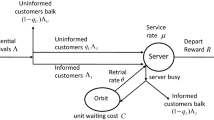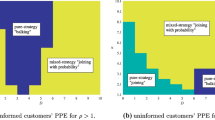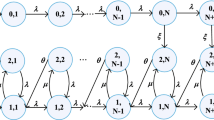Abstract
Understanding the impact of the queue length information on the behavior of customers is nowadays a hot topic for strategic queueing problems. Particularly, it is important to understand how this information impacts the equilibrium behavior and therefore global performance metrics in order to give some recommendations to service providers for optimizing their objective. Recent works are focused on information policies in order to optimize the provider’s profit. In this work, the aim is to maximize the expected social welfare. It is intuitive that the expected social welfare is higher when more information is available to new customers. In some circumstances, and particularly when the queue is overloaded, providing the information up to a particular level of occupancy yields a better expected social welfare compared to always providing queue length information to new customers. This counterintuitive result comes mainly from the strategic behavior of customers at equilibrium when queue length information is not available. After proving that there exists such an optimal information disclosure policy (IDP) for arbitrary arrival and service rates, we go further and study the expected social welfare for the overloaded context in which the arrival rate equals the service rate. Finally, numerical illustrations corroborate our contributions, and moreover, they show that an admission control policy can be also proposed, combined with an IDP, in order to optimize the expected social welfare of the system.



Similar content being viewed by others
References
Dong, J., Yom-Tov, E., Yom-Tov, G.: The impact of delay announcements on Hospital Network Coordination and Waiting Times. Manag. Sci. 65(5), 1949–2443 (2018)
Naor, P.: The regulation of queue size by levying tolls. Econometrica 37, 15–24 (1969)
Edelson, N., Hildebrand, D.: Congestion tolls for Poisson queueing processes. Econometrica 43, 81–92 (1975)
Hassin, R.: Consumer information in markets with random products quality: the case of queues and balking. Econometrica 54, 1185–1195 (1986)
Hassin, R.: Rational Queueing. CRC Press, Boca Raton (2016)
Hassin, R., Roet-Green, R.: The impact of inspection cost on equilibrium, revenue, and social welfare in a single-server queue. Oper. Res. (2017). https://doi.org/10.1287/opre.2016.1578
Naceur, T., Hayel, Y.: Revenue maximization with access and information pricing schemes in a partially-observable queueing game. Value Tools 10(1145/3306309), 3306331 (2019)
Marianov, V., Rios, M., Barros, F.J.: Allocating servers to facilities, when demand is elastic to travel and waiting times. RAIRO Oper. Res. 39, 143–162 (2005)
Altman, E., Jimenez, T.: Admission Control to an M/M/1 Queue with Partial Information in proceedings of ASMTA (2013)
Allon, G., Bassamboo, A., Gurvich, I.: We will be right with you: managing customer expectations with vague promises and cheap talk. Oper. Res. 59(6), 1382–1394 (2011)
Ibrahim, R.: Sharing delay information in service systems: a literature survey. Queueing Syst. 89, 49–79 (2018)
Simhon, E., Hayel, Y., Starobinski, D., Zhu, Q.: Optimal information disclosure policies in strategic queueing games. Oper. Res. Lett. 44, 109–113 (2015)
Shone, R., Knight, V., Williams, J.: Comparisons between observable and unobservable M/M/1 queues with respect to optimal customer behavior. Eur. J. Oper. Res. 227(1), 133–141 (2013)
Hu, M., Li, Y., Wang, J.: Efficient ignorance: information heterogeneity in a queue. Manag. Sci. 64, 2650–2671 (2018)
Large, J., Norman, T.: Markov Perfect Bayesian equilibrium via ergodicity. Manuscript (2012)
Economou, A., Grigoriou, M.: Strategic balking behavior in a queueing system with a mixed observation structure. In: Proceedings of Stochastic Models of Manufacturing and Service Operations (2015)
Balachandran, K.R., Schaefer, M.E.: Public and private optimization at a service facility with approximate information on congestion. Eur. J. Oper. Res. 4, 195–202 (1980)
Hassin, R., Haviv, M.: To Queue or Not to Queue: Equilibrium Behavior in Queueing Systems. Kluwer Academic Publishers, Norwell (2003)
Kim, B., Kim, J.: Optimal disclosure policies in a strategic queueing model. Oper. Res. Lett. 45, 181–186 (2017)
Dimitrakopoulos, Y., Economou, A., Leaonardos, S.: Strategic Customers behavior in a queueing system with alternating information structure (2019). arXiv:1906.05628 [math.OC]
Calvert, B., Solomon, W., Ziedins, I.: Braess’s paradox in a queueing network with state dependent routing. J. Appl. Probab. 34, 134–154 (1997)
Kleinrock, L.: Queueing Systems. Wiley, New York (1975)
Xu, S.H., Gao, L., Ou, J.: Service performance analysis and improvement for a ticket queue with balking customers. Manag. Sci. 53, 971–990 (2007)
Kerner, Y., Sherzer, E., Yanco, M.: On non-equilibria threshold strategies in ticket queues. Queueing Syst. 86(3), 419–431 (2017)
Author information
Authors and Affiliations
Corresponding author
Additional information
Publisher's Note
Springer Nature remains neutral with regard to jurisdictional claims in published maps and institutional affiliations.
The authors acknowledge support from CEFIPRA 5702-1 Project for this work.
Rights and permissions
About this article
Cite this article
Naceur, T., Hayel, Y. Deterministic state-based information disclosure policies and social welfare maximization in strategic queueing systems. Queueing Syst 96, 303–328 (2020). https://doi.org/10.1007/s11134-020-09674-8
Received:
Revised:
Accepted:
Published:
Issue Date:
DOI: https://doi.org/10.1007/s11134-020-09674-8




